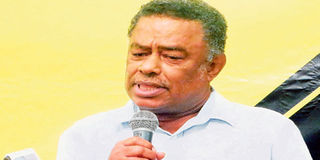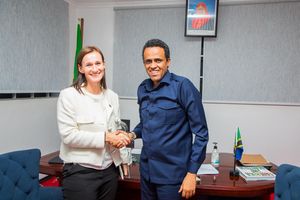‘Literature can be a tool to fight oppression’

Poet and playwright Ebrahim Hussein shares his wisdom and experience with Tanzania’s aspiring writers. PHOTO | FILE
What you need to know:
When he opened his mouth to speak, it was as if his tongue was caught by a foreign force. The flow of words in a rich accent and Kiswahili vocabulary, left everyone in the room holding their breath in awe only to culminate in a standing ovation.
He is seldom heard, he seldom speaks in public. The last time he gave a speech in front of a crowd was at the poetry prize giving event that has been named in his honour, Ebrahim Hussein Poetry Prize for Kiswahili writing.
When he opened his mouth to speak, it was as if his tongue was caught by a foreign force. The flow of words in a rich accent and Kiswahili vocabulary, left everyone in the room holding their breath in awe only to culminate in a standing ovation.
No one thought that he would attend the ceremony. He hardly makes any public appearances and prefers a quiet life. But now that he has come to the attention of the public through the Prize, Ebrahim Hussein’s poetry is once again heard.
Prof Ebrahim Hussein is the best known Swahili playwright and Tanzania’s most complex literary personality. He is the man behind literary works such as Kinjeketile (1969) as well as Mashetani (1971), an overtly political play and Jogoo Kijijini (1976). In his play Arusi (1980) he expresses disillusionment with the Tanzanian political theory Ujamaa.
To honour the legend, The Ebrahim Hussein Poetry Prize was founded by Canadian filmmaker and lover of Swahili, the late Gerald Belkin.
It is now managed by Belkin’s family,, Tanzania Gatsby Trust and Mkuki na Nyota Publishing House.
Speaking to Success, Chairman of the judging panel, Professor M.M. Mulokozi explained that the Prize was launched in 2014. Not only does it aim to honour the playwright, Prof Hussein, its objective is to also promote Kiswahili literature in Tanzania.
“It is said that people don’t write, that isn’t true. There are many writers who write in Kiswahili.
They just aren’t published and lack motivation. We want this to be a stimuli to drive them towards the right direction,” he said. A collection of poetry that was submitted last year will be released later this year.
Good motivation
Secondly, Prof Mulokozi says that the award aims at giving a monetary motivation. The prize money is Sh2million (about 1,000 USD). “Why so much money? We want people to see that this Prize has value. Writing has value,” he said.
A poet and play write
According to the ‘Dictionary of African Biography,’ Prof Ebrahim was born in Lindi. He is part of a theatre rendition that emerged after Tanzania’s independence from Britain in 1961.
The choice of Kiswahili as the official national language in 1964 created room for the development of an original literature produced by the encounter between the traditions of the Swahili speaking people of the coast and Zanzibar with the conventions of European university theatre, as taught at the University of Dar es Salaam.
As a poet and playwright, Prof Hussein became known in 1969 with a play whose protagonist, Kinjekitile, was the hero of Maji Maji rebellion in 1905; a time during which the people from Southern Tanzania opposed the Germans. Prof Hussein translated Kinjekitile to English and made the play famous outside Tanzania.
At the same time, he inaugurated writing poetry in the free verse form, also an innovation in Kiswahili literature.
Closing the literature gap
“The prize is also aimed at closing the ‘literature gap’ that is being experienced in Tanzania,” says one of Mkuki na Nyota Publishers directors, Mkuki Bgoya. He explains that there was a blooming of literature just before and after Uhuru as literary minds met to discuss the struggle for independence.
Literature is a tool for fighting oppression
Everyone had the same goal and the same message – get rid of the white man. Hence, literature was a way of speaking out and fighting oppression.
But with economic and political reforms, literature has a new face. “It isn’t just about having a political agenda. It is about art. And literature, as art, is an expression,” he says. However, with challenges facing the publishing sector, it seems difficult for many writers to find a platform where they can express themselves in the way that they want. The prize seeks to change that, no matter how little the contribution might seem.
Can young people express themselves?
Neema Komba, co-founder of La Poetista, a poetry space in Dar says that young people face much greater challenges in expressing themselves. She gives her own example saying that she isn’t comfortable in expressing herself in Kiswahili although it is a language that she uses every day. Neema says that the education system in Tanzania is what contributes to this.
If young people were encouraged to write in Kiswahili since school, it would probably be a different case.The poetry hub which she co-leads is a space where young people come and share poetry that reflects everyday life. Most of the poetry is spoken word poetry, a genre influenced by Harlem renaissance and blues music in the United States.
“Local poets would probably know Maya Angelou and her work better than they know Prof Hussein’s work, unless they went to school for literature,” says Neema; something which needs to cha-nge.
For those who want to enter the prize you may go to ‘ushairi.com’. The deadline for entry this year is April 30.




